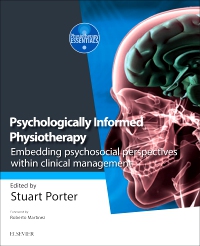
Psychologically Informed Physiotherapy, 1st Edition
Paperback

Now $52.66
The first of its kind, this textbook brings together an international and interdisciplinary team of leading experts in the field. Together they present an evidence-based range of ideas and concepts around the psychologically informed practice framework, bringing psychosocial aspects of physiotherapy to the fore alongside the established biomedical model. By applying these aspects to screening, exploration and triaging, physiotherapists are better able to identify the origins of pain and barriers to rehabilitation; and so are more likely to achieve consistently good clinical outcomes for their patients. Throughout, clinical case studies ensure that the theory is then grounded in a variety of practical scenarios after which some reflective exercises and clinically relevant scenarios reinforce learning and understanding.
Chapters on:
- Psychology of professional identity in health care
- The biopsychosocial model
- Screening for red flags
- Adapting interactions with others to form empowering relationships and influence behavioural change
- Neuro-immune-endocrine interactions and clinical practice in stress, pain and recovery
- Care of the anxious patient through cognitive and person-centred strategies
- Alternative and evolving models of practice, including the clinical flag system
- The psychology of the athlete from the physiotherapist’s perspective
- Using counselling and psychological strategies within physiotherapy
- Making evidence-based decisions and measuring effectiveness in practice
- Using psychological interventions as a student or new graduate
-
- First textbook of its kind for physiotherapists
- Ideal confidence booster for both students and practitioners new to the subject
- Illustrates the role social factors have on thoughts, emotions and behaviour in patients as well as the neurobiological manifestations of social stressors
- Presents key, evidence-based concepts from leading international academics, clinicians and researchers in the field and across a range of health professions, including counselling and psychology
-
Foreword by Roberto Martinez
Preface
Dedication
Acknowledgements
Contributors1 Professionalism And The Psychology Of Professional Identity In Health Care
Graham Copnell2 The Biopsychosocial Model: An Overview
Alec Rickard3 Screen For Red Flags First: Don’t Take The ‘Bio’ Out Of Biopsychosocial
Sue Greenhalgh, James Selfe4 Psychosocial Aspects Of Practitioners: Adapting Our Interactions With Others To Form Empowering Relationships
Jennifer E Green-Wilson5 Stress, Pain And Recovery: Neuro-Immune-Endocrine Interactions And Clinical Practice
Lester E Jones6 Care Of The Anxious Patient: Understanding And Managing Anxiety Through Cognitive And Person-Centred Strategies
Andrew L Evans, Anthony J Hickey7 Supporting, Complementary, Alternative And Evolving Models Of Practice: Towards The Development Of Your Biopsychosocial Practice
Alan Chamberlain8 The Psychology Of The Athlete – The Physiotherapist’s Perspective
Andrew Mitchell9 Using Counselling And Psychological Strategies Within Physiotherapy
Louise Henstock, Helen Carruthers, Christine Parker10 Making Evidence-Based Decisions And Measuring Effectiveness In Psychologically Informed Practice
Louise Henstock, Helen Carruthers11 Using Psychological Interventions As A Student Or Newly Qualified Physiotherapist – Personal Reflections 1 Year Post Qualifying
Katherine E CrookIndex

 as described in our
as described in our 